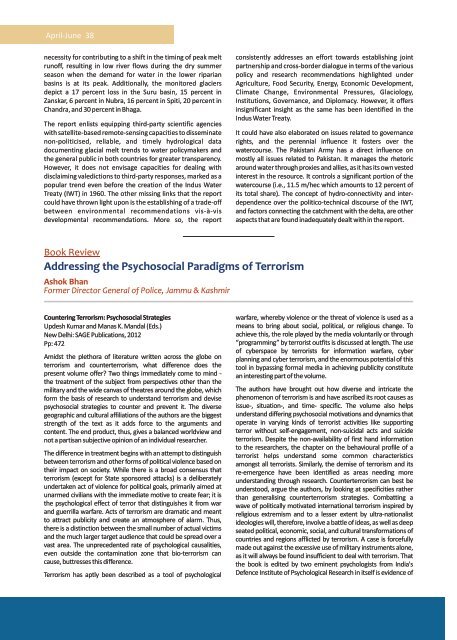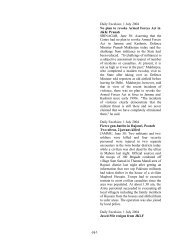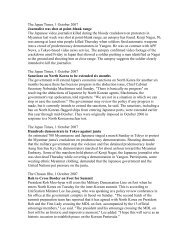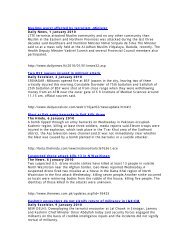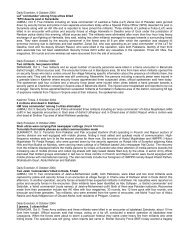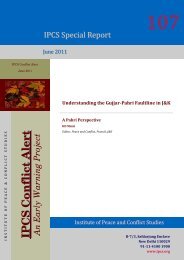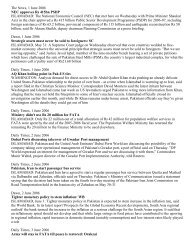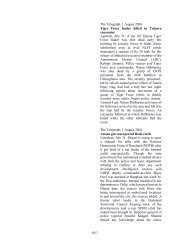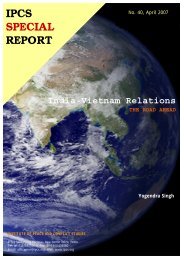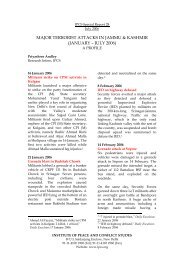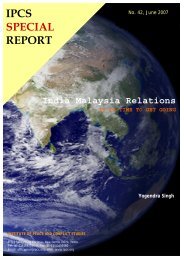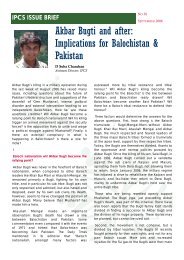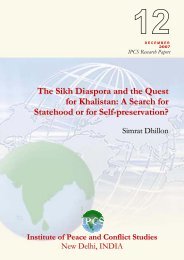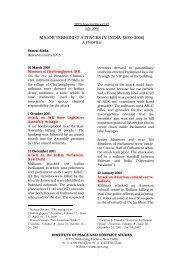April-June 2013 - Institute of Peace and Conflict Studies
April-June 2013 - Institute of Peace and Conflict Studies
April-June 2013 - Institute of Peace and Conflict Studies
You also want an ePaper? Increase the reach of your titles
YUMPU automatically turns print PDFs into web optimized ePapers that Google loves.
<strong>April</strong>-<strong>June</strong> 38<br />
necessity for contributing to a shift in the timing <strong>of</strong> peak melt<br />
run<strong>of</strong>f, resulting in low river flows during the dry summer<br />
season when the dem<strong>and</strong> for water in the lower riparian<br />
basins is at its peak. Additionally, the monitored glaciers<br />
depict a 17 percent loss in the Suru basin, 15 percent in<br />
Zanskar, 6 percent in Nubra, 16 percent in Spiti, 20 percent in<br />
Ch<strong>and</strong>ra, <strong>and</strong> 30 percent in Bhaga.<br />
The report enlists equipping third-party scientific agencies<br />
with satellite-based remote-sensing capacities to disseminate<br />
non-politicised, reliable, <strong>and</strong> timely hydrological data<br />
documenting glacial melt trends to water policymakers <strong>and</strong><br />
the general public in both countries for greater transparency.<br />
However, it does not envisage capacities for dealing with<br />
disclaiming valedictions to third-party responses, marked as a<br />
popular trend even before the creation <strong>of</strong> the Indus Water<br />
Treaty (IWT) in 1960. The other missing links that the report<br />
could have thrown light upon is the establishing <strong>of</strong> a trade-<strong>of</strong>f<br />
between environmental recommendations vis-à-vis<br />
developmental recommendations. More so, the report<br />
consistently addresses an effort towards establishing joint<br />
partnership <strong>and</strong> cross-border dialogue in terms <strong>of</strong> the various<br />
policy <strong>and</strong> research recommendations highlighted under<br />
Agriculture, Food Security, Energy, Economic Development,<br />
Climate Change, Environmental Pressures, Glaciology,<br />
Institutions, Governance, <strong>and</strong> Diplomacy. However, it <strong>of</strong>fers<br />
insignificant insight as the same has been identified in the<br />
Indus Water Treaty.<br />
It could have also elaborated on issues related to governance<br />
rights, <strong>and</strong> the perennial influence it fosters over the<br />
watercourse. The Pakistani Army has a direct influence on<br />
mostly all issues related to Pakistan. It manages the rhetoric<br />
around water through proxies <strong>and</strong> allies, as it has its own vested<br />
interest in the resource. It controls a significant portion <strong>of</strong> the<br />
watercourse (i.e., 11.5 m/hec which amounts to 12 percent <strong>of</strong><br />
its total share). The concept <strong>of</strong> hydro-connectivity <strong>and</strong> interdependence<br />
over the politico-technical discourse <strong>of</strong> the IWT,<br />
<strong>and</strong> factors connecting the catchment with the delta, are other<br />
aspects that are found inadequately dealt with in the report.<br />
Book Review<br />
Addressing the Psychosocial Paradigms <strong>of</strong> Terrorism<br />
Ashok Bhan<br />
Former Director General <strong>of</strong> Police, Jammu & Kashmir<br />
Countering Terrorism: Psychosocial Strategies<br />
Updesh Kumar <strong>and</strong> Manas K. M<strong>and</strong>al (Eds.)<br />
New Delhi: SAGE Publications, 2012<br />
Pp: 472<br />
Amidst the plethora <strong>of</strong> literature written across the globe on<br />
terrorism <strong>and</strong> counterterrorism, what difference does the<br />
present volume <strong>of</strong>fer? Two things immediately come to mind -<br />
the treatment <strong>of</strong> the subject from perspectives other than the<br />
military <strong>and</strong> the wide canvas <strong>of</strong> theatres around the globe, which<br />
form the basis <strong>of</strong> research to underst<strong>and</strong> terrorism <strong>and</strong> devise<br />
psychosocial strategies to counter <strong>and</strong> prevent it. The diverse<br />
geographic <strong>and</strong> cultural affiliations <strong>of</strong> the authors are the biggest<br />
strength <strong>of</strong> the text as it adds force to the arguments <strong>and</strong><br />
content. The end product, thus, gives a balanced worldview <strong>and</strong><br />
not a partisan subjective opinion <strong>of</strong> an individual researcher.<br />
The difference in treatment begins with an attempt to distinguish<br />
between terrorism <strong>and</strong> other forms <strong>of</strong> political violence based on<br />
their impact on society. While there is a broad consensus that<br />
terrorism (except for State sponsored attacks) is a deliberately<br />
undertaken act <strong>of</strong> violence for political goals, primarily aimed at<br />
unarmed civilians with the immediate motive to create fear; it is<br />
the psychological effect <strong>of</strong> terror that distinguishes it from war<br />
<strong>and</strong> guerrilla warfare. Acts <strong>of</strong> terrorism are dramatic <strong>and</strong> meant<br />
to attract publicity <strong>and</strong> create an atmosphere <strong>of</strong> alarm. Thus,<br />
there is a distinction between the small number <strong>of</strong> actual victims<br />
<strong>and</strong> the much larger target audience that could be spread over a<br />
vast area. The unprecedented rate <strong>of</strong> psychological causalities,<br />
even outside the contamination zone that bio-terrorism can<br />
cause, buttresses this difference.<br />
Terrorism has aptly been described as a tool <strong>of</strong> psychological<br />
warfare, whereby violence or the threat <strong>of</strong> violence is used as a<br />
means to bring about social, political, or religious change. To<br />
achieve this, the role played by the media voluntarily or through<br />
“programming” by terrorist outfits is discussed at length. The use<br />
<strong>of</strong> cyberspace by terrorists for information warfare, cyber<br />
planning <strong>and</strong> cyber terrorism, <strong>and</strong> the enormous potential <strong>of</strong> this<br />
tool in bypassing formal media in achieving publicity constitute<br />
an interesting part <strong>of</strong> the volume.<br />
The authors have brought out how diverse <strong>and</strong> intricate the<br />
phenomenon <strong>of</strong> terrorism is <strong>and</strong> have ascribed its root causes as<br />
issue-, situation-, <strong>and</strong> time- specific. The volume also helps<br />
underst<strong>and</strong> differing psychosocial motivations <strong>and</strong> dynamics that<br />
operate in varying kinds <strong>of</strong> terrorist activities like supporting<br />
terror without self-engagement, non-suicidal acts <strong>and</strong> suicide<br />
terrorism. Despite the non-availability <strong>of</strong> first h<strong>and</strong> information<br />
to the researchers, the chapter on the behavioural pr<strong>of</strong>ile <strong>of</strong> a<br />
terrorist helps underst<strong>and</strong> some common characteristics<br />
amongst all terrorists. Similarly, the demise <strong>of</strong> terrorism <strong>and</strong> its<br />
re-emergence have been identified as areas needing more<br />
underst<strong>and</strong>ing through research. Counterterrorism can best be<br />
understood, argue the authors, by looking at specificities rather<br />
than generalising counterterrorism strategies. Combatting a<br />
wave <strong>of</strong> politically motivated international terrorism inspired by<br />
religious extremism <strong>and</strong> to a lesser extent by ultra-nationalist<br />
ideologies will, therefore, involve a battle <strong>of</strong> ideas, as well as deep<br />
seated political, economic, social, <strong>and</strong> cultural transformations <strong>of</strong><br />
countries <strong>and</strong> regions afflicted by terrorism. A case is forcefully<br />
made out against the excessive use <strong>of</strong> military instruments alone,<br />
as it will always be found insufficient to deal with terrorism. That<br />
the book is edited by two eminent psychologists from India's<br />
Defence <strong>Institute</strong> <strong>of</strong> Psychological Research in itself is evidence <strong>of</strong>


